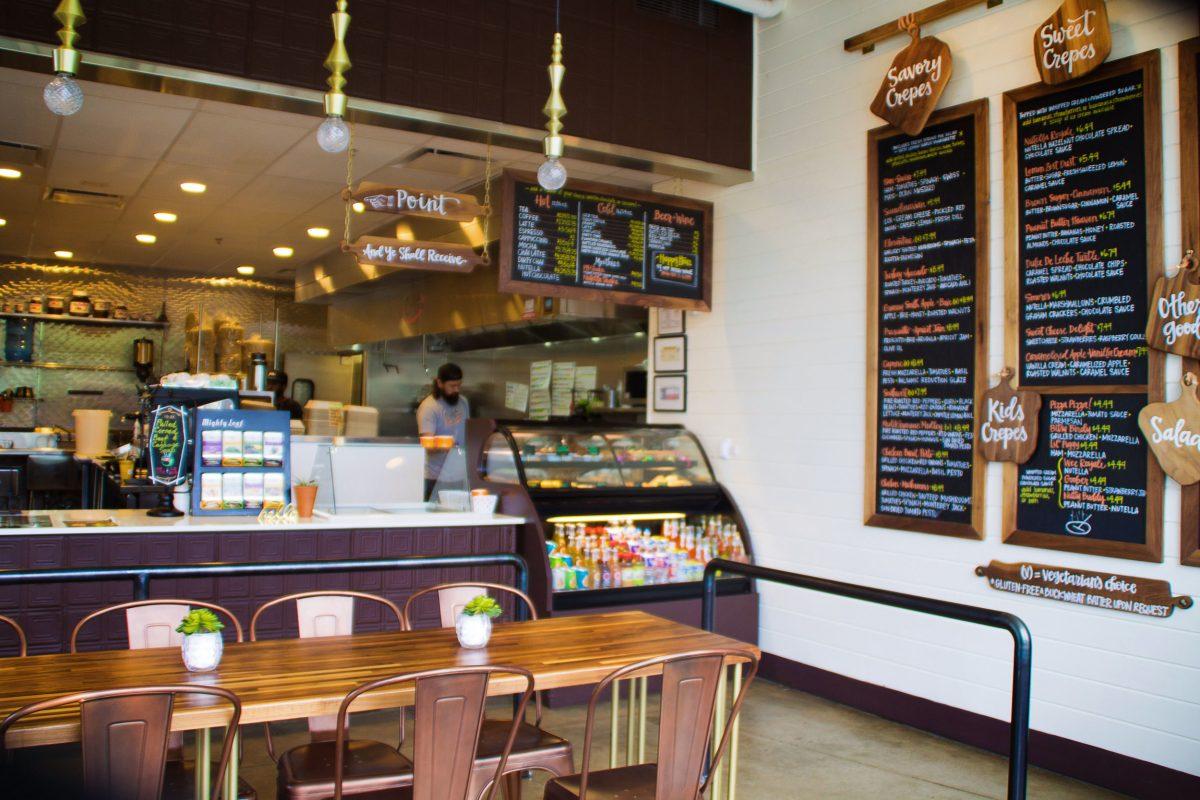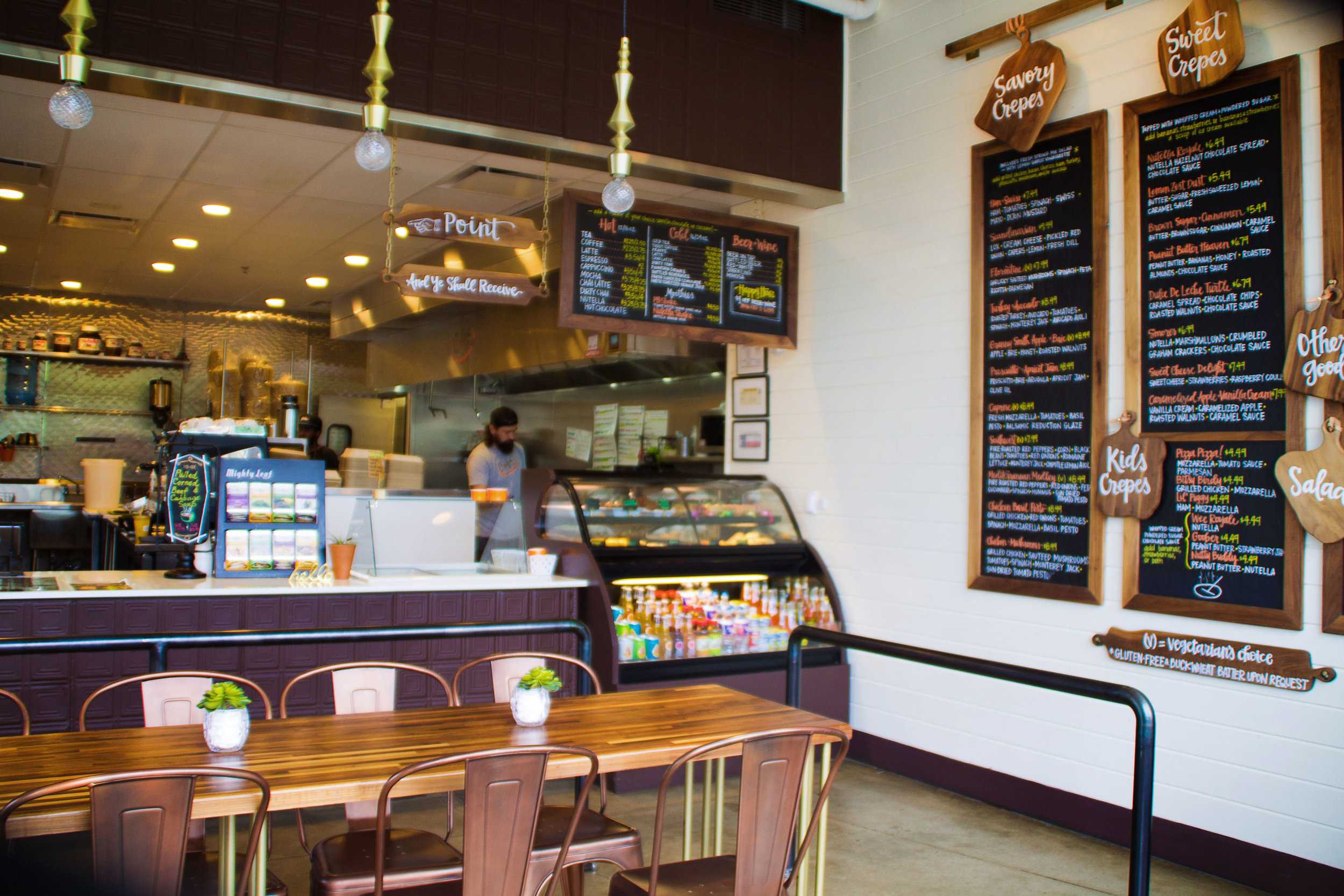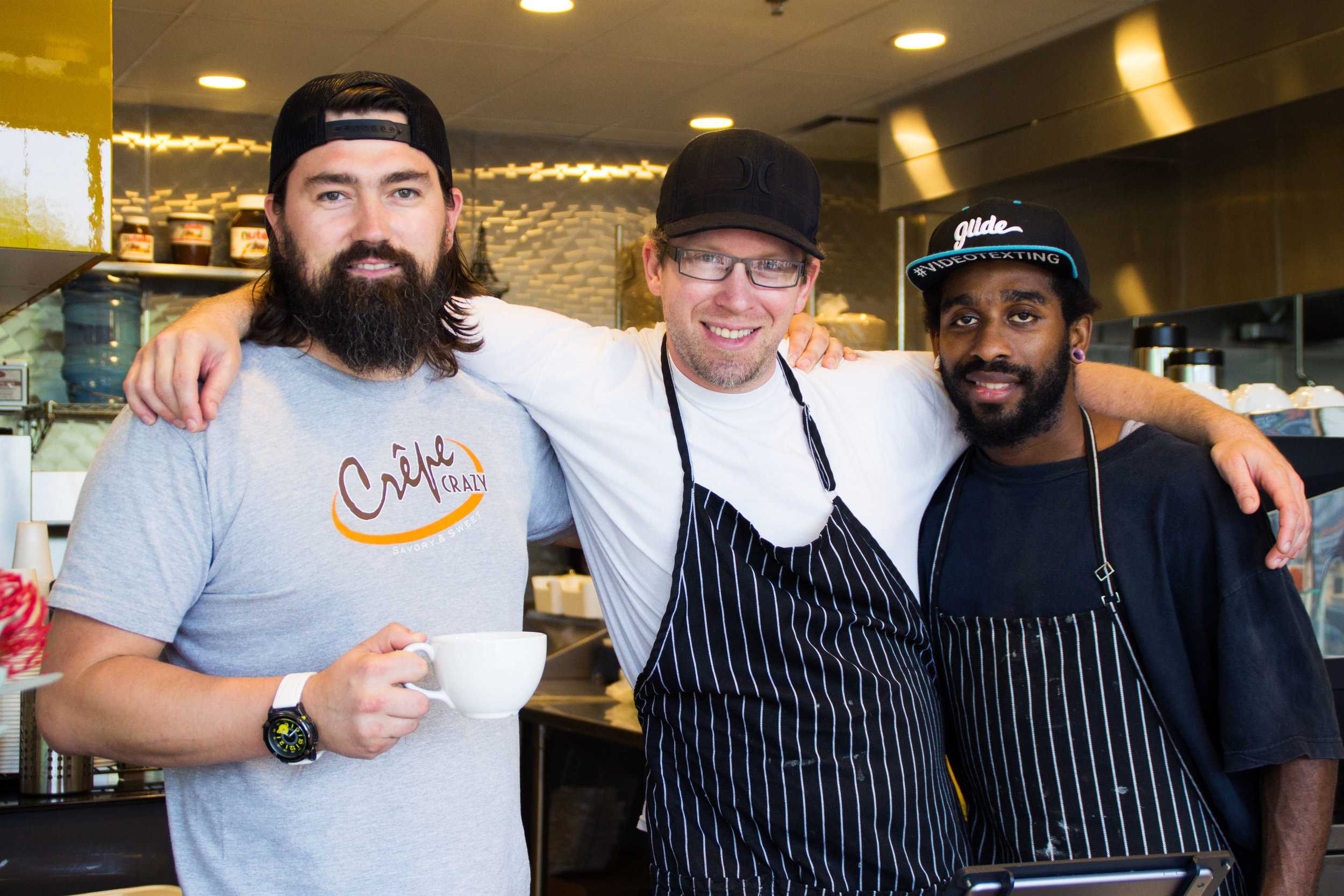Editor’s Note: This story was originally published in Digital Issue V.
On South Lamar Boulevard, about 15 minutes away from Downtown Austin, sits Crepe Crazy, a quaint cafe serving authentic Russian crepes. Sure, like any other cafe the chairs scrape, the oven sizzles, and the customers chatter politely, but there’s an unusual silence here, a silence that you notice immediately after walking through the door. A sign emblazoned with“Point and ye shall receive” hangs above the counter.
By London Gibson
Following instructions, you point toward the menu at the crepe you want to order. The employee behind the counter nods his head, draws up your order and heads to the back to work on your crepe. You still sense the silence, but now you understand. The chairs scrape, the oven sizzles, and the customers chatter politely, but the workers don’t hear a sound.
The deaf-owned cafe exclusively hires deaf and hard-of-hearing workers. Founders Inna and Vladimir Giterman, husband and wife, opened the Austin branch of Crepe Crazy in December 2015. The business, however, has been years in the making. “Crepe Crazy began with my husband Vladimir’s insatiable appetite for his late mother’s crepes,” Inna Giterman says.
Although crepes were always a part of the Giterman family’s life, they did not think to start a crepe restaurant until many years after Inna and Vladimir met. When they moved to New York City from Rostondovon, Russia and Kiev, Ukraine in 1990 in pursuit of a better life, they found one aspect of America particularly surprising. “There were deaf business owners,” Inna says. “The chances of that happening in Russia is slim to none, at best.” The family migrated to Austin in 1996 where they waited for their big opportunity in business.
While they searched, they spent their time making crepes. They received so much praise from their friends for their crepes that they realized a restaurant just might be their future. “Thus, the birth of Crepe Crazy,” says Inna.
The start was slow. The couple introduced the name Crepe Crazy to the world in 2007, with a small cart in Downtown Austin. As they gained success, they participated in festivals, eventually opening a brick-and-mortar location in Dripping Springs, and then in Austin in December of 2015.
The atmosphere at Crepe Crazy fits right in with Austin. Funky orange wallpaper and quaint decor wash the restaurant in warm golden and bronze hues. Clean brown and white tables, adorned with succulents, line the perimeter. Sitting up against the window, Angela Gallegos, geography senior at the University of Texas at Austin, tastes the chicken basil pesto crepe on her first visit to the restaurant. Like many great comfort foods, it’s full of cheese, chicken and crammed with gluten.
Crepe Crazy has a welcoming and quirky atmosphere.
Gallegos discovered Crepe Crazy on Yelp. “I was looking for something different,” Gallegos says. After seeing — and tasting — what Crepe Crazy has to offer, Gallegos decides, “I love it.” For Gallegos, the history and message of Crepe Crazy is just as important as their food. “I would come here just for the cause, but the food is a bonus,” she says, laughing.
Even though the staff at Crepe Crazy consists entirely of deaf and hard-of-hearing workers, it functions much like every other cafe does, with a few exceptions. A large menu on the counter table to point at and a LED writing board allow customers to deal their orders and ask questions. The employees at Crepe Crazy come from all over the world, some following the Gitermans all the way from Europe. “If I could, I would pay my employees six figures each,” says Sergei, the Giterman’s son. “They have stuck with us from the very beginning.”
One of the main reasons that Crepe Crazy hires only deaf workers is to provide work for a demographic that has trouble finding positions. “We always feel fortunate to be in this position, making quality food with exceptional service while creating jobs for those that don’t get the same opportunity,” Sergei says.
The job market becomes increasingly competitive every year, and deaf employees find it especially difficult to land full-time work. Stephanie Cawthon, Associate Professor in the Department of Educational Psychology at UT, studies accessibility for deaf and hard-of-hearing (DHH) students. Cawthon devotes her time to trying to understand what separates DHH students in schools and in the job market. “There’s a lot of resistance to hiring a deaf person,” Cawthon sys. “A lot of employers say, ‘well, that’s going to be expensive.’”
In addition, a report by the Meadows Center for Preventing Educational Risk states “negative attitudes toward individuals with disabilities have existed throughout history, and still exist today.” The same report attributes “limited occupational opportunities” to negative preconceptions towards deaf and hard-of-hearing individuals.
In Cawthon’s opinion, attitude is “the least recognized” obstacle facing DHH workers. Because Cawthon is hard-of-hearing herself, she is familiar with the issues facing these workers applying for a job. For her, it’s a matter of intimidation: many in the deaf labor force are dissuaded by the prejudices in the job market.
At Crepe Crazy, prejudice toward the deaf seems non-existent. Employees shuffle in the kitchen while customers file in, point to their orders and then fill the tables edging the walls. Servers swish about, carrying trays topped with steaming crepes and delivering orders.
Workers Maksim Kleimenov, Sean Sutor and Larendran Hubbard pose during their shifts for the camera.
Like the beat of a silent drum, the rhythm of the cafe is consistent and seamless. Some customers use sign language to talk to each other. A woman leans back laughing and bathes herself in the midday sunlight. The harsh lines that so often separate the deaf from the hearing seem to dissolve at Crepe Crazy, washed away upon entering the room.
The tasty menu at Crepe Crazy only adds fuel to the frenzy of attention it has received. “If it was just a deaf-owned business and the food was terrible, we’re not going to feel the same way,” says Cawthon. “It’s the quality and the pride of it being deaf-owned.”
And the crepes at Crepe Crazy are delicious. An employee carries out the brown sugar and cinnamon crepe, doused in warm butter, drizzled with caramel sauce and bordering on dreamlike. Like a warm apple pie sans the apples, this crepe’s smell alone makes mouths water.
Similarly, the s’mores crepe wafts sweet smells from its plate, so thick and stuffed with chocolate and marshmallows it’s difficult to pick up. Melted chocolate—so hot that it’s downright messy—leaks out of the sides with every bite, thickened by marshmallows but still barely contained by the thin papery crepe casing. “A good meal really can set the mood for the day,” Sergei says.
While Crepe Crazy has acquired regular customers like every other cafe, people come to the cafe for the first time every day. “You [can] tell that the first comers are full of questions,” Sergei says. “But after eating through their meal, they settle on one thing: the food is amazing.”
Sergei believes that the impact Crepe Crazy has had on the community will incite change. “While our impact cannot be quantified, its profound,” he says. He is fond of idea that Crepe Crazy will cause people to ask questions and pay more attention to the deaf community and its capabilities. “That opens up a world of possibilities,” he says.
“I always think about all the people that crossed our path, those with no knowledge to little understanding of the whole deaf idea,” Sergei says. “I am willing to bet they walk away astonished, their minds reeling.”
As you leave Crepe Crazy, the employee behind the counter smiles, raises his fingers to his chin and gestures them out toward you: the sign for thank you.













































